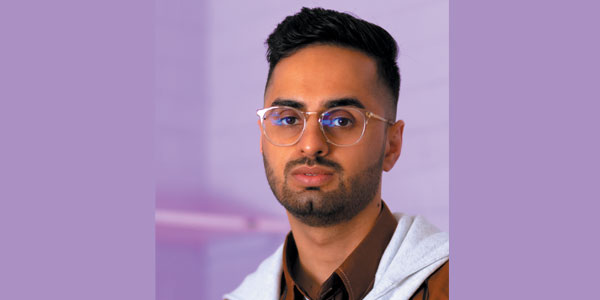A heart for the queer and gay
- Brigitte Read
Dr Ahmed Badat spends his life focusing on improving LGBTQIA+ mental health training for medical students.

It was a comment during a talk on transgender mental health while doing his community service that hit a nerve for Dr Ahmed Badat. Addressing a room full of medical professionals, a very experienced senior clinician made an aside remark about the need to preserve heterosexual relationships. The comment stirred anger in Badat and made him realise that something needed to change.
Research shows that there is still a high prevalence of homophobia among medical doctors. Many still believe sexuality is a choice or that conversion therapy is appropriate. Badat had witnessed discrimination towards queer patients in the healthcare setting, yet notes that in his own six years of undergraduate training, he only had one lecture about LGBTQIA+ communities, which was related to health.
“Going through med school, I realised that healthcare for the LGBTQIA+ community is not a priority in terms of medical education, and that’s not necessarily as a result of discrimination. It is six years and medicine is vast and there is much to cover, but also historically medicine is rooted in a very heteronormative space. For example, we’re not taught to ask patients their pronouns as part of the formal training.”
Caring for LGBTQIA+ patients
As a result, Badat’s research for his MMed in Psychiatry is focused on assessing final year medical students’ preparedness for caring for LGBTQIA+ patients with mental illness. Part of his hypothesis is that the LGBTQIA+ population is a minority population and individuals are therefore subject to distinct stressors which may negatively affect their mental health. There is a large body of research which highlights the increased prevalence of depression, anxiety, suicidality and substance-use disorders amongst the queer population.
Badat’s research, currently in the data collection phase, assesses medical professionals’ ability to provide care for LGBTQIA+ patients, looking at clinical awareness, attitudinal awareness and basic knowledge. Badat also evaluates knowledge about the specific mental healthcare needs of LGBTQIA+ populations and if students feel prepared to provide adequate mental healthcare to LGBTQIA+ patients after completing their psychiatry rotation.
“My aim is to identify areas for improvement in the care for LGBTQIA+ patients so that undergraduate medical education can be adjusted to adequately prepare future doctors and improve the quality of mental healthcare received by queer people,” explains Badat. “This is all long-term work, that will require buy-in from many different parties, but I’m hoping to get the ball rolling and that this creates an opening for improvement in medical education on LGBTQIA+ issues.”
Drawn to people’s narratives
An ardent TV series fan, Badat was initially inspired to go into medicine after watching Grey’s Anatomy. Now he particularly enjoys podcasts and documentaries in the true crime genre, and this curiosity about people’s motivations and narratives is what drew him to psychiatry. He is a massive fan of Survivor, admitting to becoming quite invested in analysing the contestants’ personalities and strategies. He is also a die-hard Harry Potter devotee, His favourite character is the intelligent and steadfast Hermione – he believes that she is the true hero of the series – and his Hogwarts house is Ravenclaw, which fittingly embodies wisdom, wit and academic learning.
Badat currently works as a Registrar at the Tara Psychiatric Hospital where he serves patients with severe personality pathology. He acknowledges that he has found this rotation to be the most stimulating and rewarding so far. Coincidentally, he works in the same ward wherein which he completed his psychiatry rotation as a final year student and where he became convinced that psychiatry was the path he wanted to follow. His Registrar at that time was Dr Sanushka Moodley and in a poetic full circle, she is now his research supervisor.
“As my Registrar, she was a role model in terms of who I wanted to be - nurturing, willing to teach, so kind, but she also delivered such a high standard of care and compassion for her patients. And hopefully I can give the medical students here now a similar experience.”
When people have greater understanding, there is also a chance that they will have greater empathy.
(Badat also acknowledges the support and mentorship that he has received so far from Dr Laila Paruk and the Wits Head of Psychiatry, Professor Ugasvaree Subramaney.
Moodley was his first guest on a podcast he created called Purple Couch: A Psychiatry Podcast. The podcast series is intended to serve as a study aid for medical students and junior doctors. Featuring a different mental healthcare practitioner in each episode, the show aims to provide information specifically related to the South African context.
Badat admits that if he wasn’t a doctor, he would probably be a teacher. This seems fitting as his research is aimed at improving undergraduate medical training to better prepare clinicians to understand the unique challenges of the LGBTQIA+ communities, and to ultimately lead to better care for all.
“Education has been shown to reduce prejudice. When people have greater understanding, there is a chance that they will have greater empathy.”
- Brigitte Read is a freelance writer.
- This article first appeared in?Curiosity, a research magazine produced by?Wits Communications?and the?Research Office.
- Read more in the 13th issue, themed: #Gender. We feature research across disciplines that relates to gender, feminism, masculinity, sex, sexual identity and sexual health.
